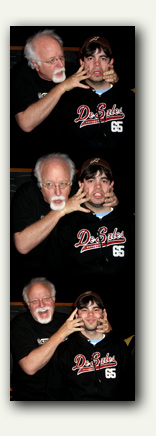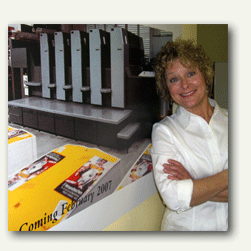by Gary Powell
 Rational, investigative and creative disciplines continue to be circumvented the much easier path of just making stuff up! “Copy and paste” music-making is now widely accepted as a legitimate production standard and because of this lowered standard the creative credentials across all the arts and sciences have been co-opted into the service of sycophants, pretenders and deal makers. With neither a discerning eye or direct experience, young artisans are sucked into a swirling system where the terms songwriter, composer, musical arranger and producer all become meaningless and interchangeable. Simply having an opinion about any creative gesture, regardless of the artistic discipline, is the same as the creation itself.
Rational, investigative and creative disciplines continue to be circumvented the much easier path of just making stuff up! “Copy and paste” music-making is now widely accepted as a legitimate production standard and because of this lowered standard the creative credentials across all the arts and sciences have been co-opted into the service of sycophants, pretenders and deal makers. With neither a discerning eye or direct experience, young artisans are sucked into a swirling system where the terms songwriter, composer, musical arranger and producer all become meaningless and interchangeable. Simply having an opinion about any creative gesture, regardless of the artistic discipline, is the same as the creation itself.
Wall Street Journal writer John J. Miller in his article for Opinion Journal suggests that “libraries should seek to shore up the culture against the eroding force of trends.” Benjamin Franklin and his think-tank, the Junto Society, first founded the idea of the public lending library in Pennsylvania. Knowledge was no longer to be accessible only by the elite and the aristocrat. Despite Dr. Franklin’s efforts, there is now evidence that the public library is no longer the keeper of our national coherence. So, who is?
Just like craftsmen of the machine age of the early 20th century, modern musicians have been losing their recording session work to synthesizers and samplers since the mid 1970’s.
Similar to what has happened to professional musicians, composers are also now at risk of losing their jobs to both software and blurred professional boundaries around creative credentials. There is plenty of blame to go around for this including the lack of both personal and organizational ethics along with a legal system which supports both of them.
Writing music is the ability composers develop and use to deliver their musical ideas in a form discernible by other musicians. The eroding trends of the point-click-copy-paste music-making demands understanding. First of all, this is not music composition. With the help of technology, this is simply choosing preexisting compositional elements. Assuming we continue teaching musically literate players, most of these students are now finding their lifelong goals of becoming adult professional musicians compromised. Composers are suffering the same fate. So, is this really an ethical dilemma or simply a market inevitability? It’s hard to diagnose how a wheel turns if you are a spoke. But, it’s even harder if you wish to affect some change of direction without losing your own purpose or crashing the entire wagon. Then again, maybe the wagon deserves to crash.
Benjamin Franklin was a master painter of the big picture even though he was in it himself. He was the keeper of the flame even while working both sides of the Atlantic. The flame was one of free speech and the effort to maintain the integrity of the individual so that each person might prosper from the seeds of their own education, preparation, risk and labor by means of personal freedom.
But, why should you care about Benjamin Franklin? Because, whoever is standing closest to the cash register keeps the money. Here is where greed and shortsightedness often sacrifice individual initiative and progress. While still young, it’s hard to understand how part of you is sacrificed during this transaction. Benjamin Franklin was offered and could have easily sold out the colonies for a cushy life in England. He was indeed standing by the cash register. He made a different choice, because he personally came to understand that he was the keeper of the flame. This is why you need to meet this man!
The keeper of the flame is now me and hopefully you. But more pointedly, the flame is you and me. This is where, despite being in the big picture ourselves, we call out the allies of education, competence, hard work, talent and loyal associates to keep all our flames together burning brightly.
This is how we will keep our lives culturally rich, our bank accounts full and our careers satisfyingly prosperous. This is the place where we as musicians deepen our relationship with both our individual and collective creativity. This is where, like Benjamin Franklin, we make a difference for the whole of the good.
Please consider the links below
for further reading and study:
Benjamin Franklin: An American Life

Benjamin Franklin: An American Life by author Walter Isaacson
Library of Congress
Wikipedia on the United States Bill of Rights
The Oxford Club Investment Newsletter on Benjamin Franklin’s The Way to Wealth
The image of Benjamin Franklin above is from the United States National Postal Museum and is used in accordance with the non-commercial Fair-use Policy of the Smithsonian Institute.
All Content of Gary Powell’s Site is Licensed Under a
Creative Commons Attribution-NonCommercial-NoDerivs 2.5 License

.
by Gary Powell
 Rational, investigative and creative disciplines continue to be circumvented the much easier path of just making stuff up! “Copy and paste” music-making is now widely accepted as a legitimate production standard and because of this lowered standard the creative credentials across all the arts and sciences have been co-opted into the service of sycophants, pretenders and deal makers. With neither a discerning eye or direct experience, young artisans are sucked into a swirling system where the terms songwriter, composer, musical arranger and producer all become meaningless and interchangeable. Simply having an opinion about any creative gesture, regardless of the artistic discipline, is the same as the creation itself.
Rational, investigative and creative disciplines continue to be circumvented the much easier path of just making stuff up! “Copy and paste” music-making is now widely accepted as a legitimate production standard and because of this lowered standard the creative credentials across all the arts and sciences have been co-opted into the service of sycophants, pretenders and deal makers. With neither a discerning eye or direct experience, young artisans are sucked into a swirling system where the terms songwriter, composer, musical arranger and producer all become meaningless and interchangeable. Simply having an opinion about any creative gesture, regardless of the artistic discipline, is the same as the creation itself.
Wall Street Journal writer John J. Miller in his article for Opinion Journal suggests that “libraries should seek to shore up the culture against the eroding force of trends.” Benjamin Franklin and his think-tank, the Junto Society, first founded the idea of the public lending library in Pennsylvania. Knowledge was no longer to be accessible only by the elite and the aristocrat. Despite Dr. Franklin’s efforts, there is now evidence that the public library is no longer the keeper of our national coherence. So, who is?
Just like craftsmen of the machine age of the early 20th century, modern musicians have been losing their recording session work to synthesizers and samplers since the mid 1970’s.
Similar to what has happened to professional musicians, composers are also now at risk of losing their jobs to both software and blurred professional boundaries around creative credentials. There is plenty of blame to go around for this including the lack of both personal and organizational ethics along with a legal system which supports both of them.
Writing music is the ability composers develop and use to deliver their musical ideas in a form discernible by other musicians. The eroding trends of the point-click-copy-paste music-making demands understanding. First of all, this is not music composition. With the help of technology, this is simply choosing preexisting compositional elements. Assuming we continue teaching musically literate players, most of these students are now finding their lifelong goals of becoming adult professional musicians compromised. Composers are suffering the same fate. So, is this really an ethical dilemma or simply a market inevitability? It’s hard to diagnose how a wheel turns if you are a spoke. But, it’s even harder if you wish to affect some change of direction without losing your own purpose or crashing the entire wagon. Then again, maybe the wagon deserves to crash.
Benjamin Franklin was a master painter of the big picture even though he was in it himself. He was the keeper of the flame even while working both sides of the Atlantic. The flame was one of free speech and the effort to maintain the integrity of the individual so that each person might prosper from the seeds of their own education, preparation, risk and labor by means of personal freedom.
But, why should you care about Benjamin Franklin? Because, whoever is standing closest to the cash register keeps the money. Here is where greed and shortsightedness often sacrifice individual initiative and progress. While still young, it’s hard to understand how part of you is sacrificed during this transaction. Benjamin Franklin was offered and could have easily sold out the colonies for a cushy life in England. He was indeed standing by the cash register. He made a different choice, because he personally came to understand that he was the keeper of the flame. This is why you need to meet this man!
The keeper of the flame is now me and hopefully you. But more pointedly, the flame is you and me. This is where, despite being in the big picture ourselves, we call out the allies of education, competence, hard work, talent and loyal associates to keep all our flames together burning brightly.
This is how we will keep our lives culturally rich, our bank accounts full and our careers satisfyingly prosperous. This is the place where we as musicians deepen our relationship with both our individual and collective creativity. This is where, like Benjamin Franklin, we make a difference for the whole of the good.
Please consider the links below
for further reading and study:
Benjamin Franklin: An American Life

Benjamin Franklin: An American Life by author Walter Isaacson
Library of Congress
Wikipedia on the United States Bill of Rights
The Oxford Club Investment Newsletter on Benjamin Franklin’s The Way to Wealth
The image of Benjamin Franklin above is from the United States National Postal Museum and is used in accordance with the non-commercial Fair-use Policy of the Smithsonian Institute.
All Content of Gary Powell’s Site is Licensed Under a
Creative Commons Attribution-NonCommercial-NoDerivs 2.5 License

.

 Wherever you are is the entry point – Kabir, Musician Saint of India
Wherever you are is the entry point – Kabir, Musician Saint of India

 Rational, investigative and creative disciplines continue to be circumvented the much easier path of just making stuff up! “Copy and paste” music-making is now widely accepted as a legitimate production standard and because of this lowered standard the creative credentials across all the arts and sciences have been co-opted into the service of sycophants, pretenders and deal makers. With neither a discerning eye or direct experience, young artisans are sucked into a swirling system where the terms songwriter, composer, musical arranger and producer all become meaningless and interchangeable. Simply having an opinion about any creative gesture, regardless of the artistic discipline, is the same as the creation itself.
Rational, investigative and creative disciplines continue to be circumvented the much easier path of just making stuff up! “Copy and paste” music-making is now widely accepted as a legitimate production standard and because of this lowered standard the creative credentials across all the arts and sciences have been co-opted into the service of sycophants, pretenders and deal makers. With neither a discerning eye or direct experience, young artisans are sucked into a swirling system where the terms songwriter, composer, musical arranger and producer all become meaningless and interchangeable. Simply having an opinion about any creative gesture, regardless of the artistic discipline, is the same as the creation itself. 
 YOUR “EAR” IS JUST AS IMPORTANT AS YOUR VOICE.
YOUR “EAR” IS JUST AS IMPORTANT AS YOUR VOICE.


